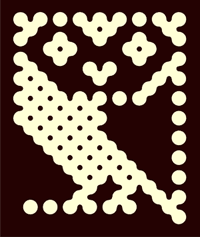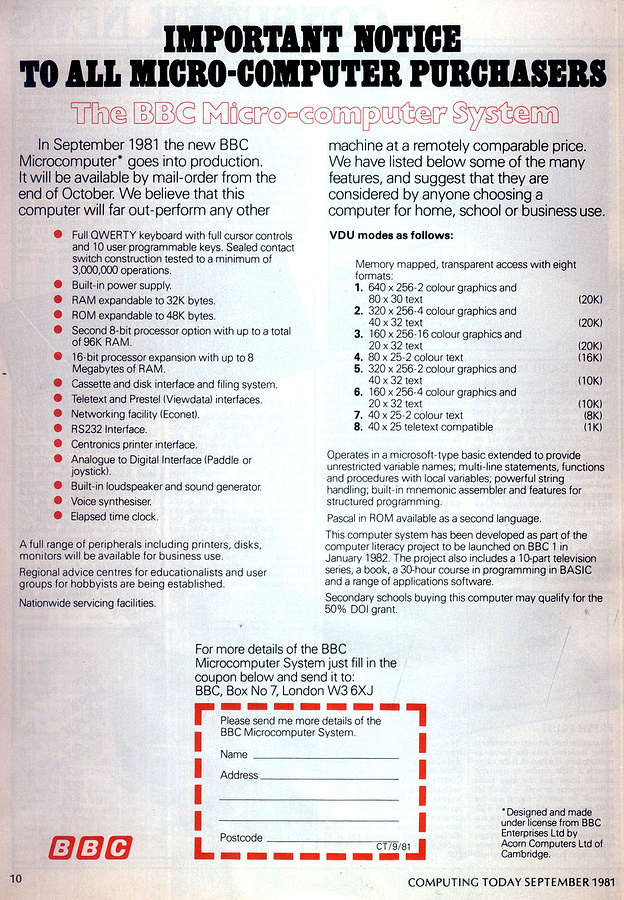BBC Computer Literacy Project

The BBC Computer Literacy Project was created in the late 1970's and delivered its first computer in the early 1980's with the aim of engaging interested parties with the world of computing and providing learning opportunities by direct experience using a Microcomputer. As part of the project, the BBC produced a television series (The Computer Programme) and documentation that was tied to a computer system providing manuals, applications and a course in programming BASIC. The Computer Literacy Project archive was made publicly available online in June 2018.
Primarily, the project was aimed at an adult audience but it soon expanded to encompass schools and it became the foundation from which computer science and information technology was introduced into the school curriculum throughout the United Kingdom.
Here's a quick video of the pre-titles and titles from the first show of "The Computer Programme"
Original Specification
As part of the BBC Computer Literacy Project, the Microcomputer system had a specification that favoured expandability with options to add second processors, disc drives, a teletext adapter and more memory. With an enhanced specification requiring additional features such as an analogue to digital interface, print capability, a serial port and networking capabilities.
Of all the computers that were put forward during the tender process, the prototype of the Acorn Proton was chosen as it most closely met the requirements that had been set out by the BBC. The Acorn Proton was rebadged as the BBC Microcomputer System Model A and B, and the rest as they say, is history.

Scanned image used under the Creative Commons licence from Nosher.net
Later BBC Microcomputers
As time passed, Acorn developed more modern designs to keep pace with technology that became the next BBC Microcomputer System. After launching the Computer Literacy Project with the Model A and B (1981), the Acorn BBC Microcomputer B+ (1984), Acorn BBC Master series, including the "Compact" (1986), and the Acorn BBC Archimedes 300 series (1987) formed part of the project with the final computer in the project being the Acorn BBC A3000 which was introduced in 1989. In general though, only the 8-bit computers were referred to as BBC Micro's whereas the 32-bit computers were referred to as Acorn Archimedes computers.
In the rolling demo showing off the A3000's capabilities, it's clearly introduced as "The New BBC Micro" in one of the windows on the Desktop.
Acorn developed further computers based on the ARM technology they developed in the 1980's however by then the BBC's Computer Literacy Project had come to an end and so they had to compete with the cheaper IBM PC compatible clones which had begun to flood the marketplace.
Legacy
The BBC Computer Literacy Project had a profound effect on a generation of British programmers let alone myself and my computing education is closely tied to the project and you can read my account of how the BBC Micro and the BBC Computer Literacy Project impacted my education and my life within this site.
In terms of the technology that was developed by Acorn, the ARM processor is now the most widespread processor technology the world has ever seen due to its low cost, low power consumption and relatively high processing power and the ARM processor can be found in most mobile phones today along with other technologies such as the Raspberry Pi which brings the technology full circle in many ways as it is aimed squarely at the educational market and is able to run the latest version of RISC OS which was originally developed by Acorn for the Acorn BBC Archimedes 300 series computers which formed part of the BBC's Computer Literacy Project.
Translate this site
The BBC Micro in Education
External links
Towards Computer Literacy
In 1983, the BBC published a document called Towards Computer Literacy which detailed the process and requirements they had when developing the BBC Computer Literacy Project between 1979 and 1983. The document addressed the intended audience research, computer specifications, educational support and television programmes that would use the BBC sponsored computer system.
You can download a copy of the Towards Computer Literacy Project here.